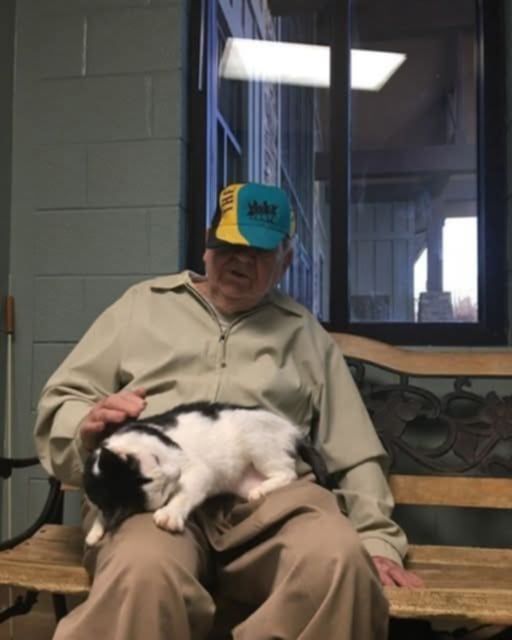Whiskers had always been something of a legend at Rosewood Manor, the nursing home where I worked. No one knew where he came from. One day, he simply walked through the front doors, tail held high, as if he owned the place. He tolerated most of us only because we fed him—but from the moment he arrived, he chose Mr. Delano as his own.
Every morning, without fail, Whiskers would pad down the hallway, winding past wheelchairs and potted plants, and leap gently into Mr. Delano’s lap. There they’d sit—an old man and a black-and-white cat, wrapped in a hush of shared solitude. Mr. Delano would stroke his fur with trembling hands, whispering soft confidences while sunlight spilled through the window. Sometimes, if you listened closely, you’d hear him murmur stories of his youth: rambling walks along country lanes, the warmth of a fire, and a kitten who once curled beside him—black and white, just like Whiskers.No one else heard those stories. But all of us saw the bond between them grow—quiet, steadfast, irreplaceable.
Then, one morning, Mr. Delano was gone. He had slipped away in his sleep, peaceful and alone. But Whiskers wasn’t by the window that day. We found him curled on the bed beside Mr. Delano’s still form, eyes half-closed, unmoving. He wouldn’t eat. He wouldn’t play. He barely blinked.
While packing up Mr. Delano’s few belongings—a frayed cardigan, some dog-eared paperbacks—we found a photograph tucked in a drawer. It showed a younger Mr. Delano holding a black-and-white kitten, smiling as if frozen in a perfect summer day. On the back, in a careful script, were five words: My boy, always waiting.The words hit me like a whisper from the past. I looked at Whiskers and wondered—was he waiting, too?
In the days that followed, Whiskers wandered the halls, listless and searching. He refused food, ignored the sunbeams he used to chase, and stopped curling up in his favorite chair. Each evening, he’d sit by the front door, ears pricked, watching for someone who never came.Then, one gray afternoon, I heard a soft mew in the foyer. Whiskers stirred. He rose, suddenly alert, and padded toward the door with a grace I hadn’t seen since before Mr. Delano passed. Curious, I followed.
Under the flickering porch light stood a young man—mid-twenties, coat zipped tight, eyes haunted by grief. The moment he saw Whiskers, he froze.
“Scout?” he whispered, kneeling.
Whiskers—Scout?—let out a low purr and pressed his head into the man’s palm. The young man’s eyes filled with tears. “I thought you’d never come back.”
I stepped forward, heart pounding. “Do you know him?”He looked up, his voice raw. “He was mine. Years ago. My grandfather—Mr. Delano—used to tell me Scout would find his way back. I thought it was just a story.”
He showed me an old photo on his phone: a young boy, eight or nine, grinning beside a kitten with the same green eyes and white-tipped paws. “I didn’t even know my grandfather was here until they called me. I came hoping for something—anything—to hold onto.”
He looked down at Whiskers, who now purred loudly, wrapping himself around the man’s legs.
“I think I found it.”
Later, we sat in the common room with tea and Mr. Delano’s photo albums. The young man—Daniel—shared memories of sunlit fields, backyard forts, and a cat that was always at his heels. He spoke of regret: of growing older, of letting distance win, of not finding his grandfather sooner.
When Daniel stood to leave, Whiskers followed. At the door, Daniel turned. “Would you… mind if I took him with me?”
Whiskers mewed, as if answering for both of them.
“I think we’ve both been waiting,” he said.
That night, as I turned off the lights and locked the doors, I thought of Mr. Delano. Of the photograph. Of Whiskers—Scout—finding his boy again. Love, I realized, has a quiet patience. It waits in the corners of memory, in the pages of old books, in the warmth of a well-worn lap. It waits until the moment is right for a homecoming.
And sometimes, when the stars align just right, love finds its way back—on four soft paws, with a purr that says, I never stopped waiting.
